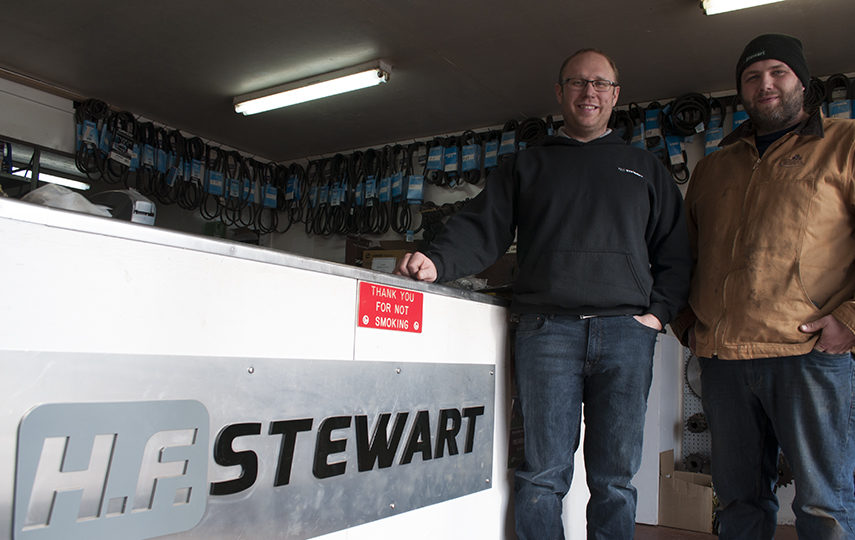Sandy and Stephen Stewart find new revenue through innovation
Down a winding secondary road in the west end of the Island is a booming business, built on hard work, family values, and innovation. H.F. Stewart is a second-generation company and their contribution to the agricultural landscape—in particular, potato agriculture—of PEI has been substantial over the past 30 years.
When considering potato agriculture in PEI, fields of potato blossoms, the farmers who planted those potatoes, and processing plants typically spring to mind. But did you ever consider where the potato trucks that haul the harvest were manufactured? Chances are you haven’t, but it’s likely they were manufactured right here on PEI, in a little spot called West Point.
H. F. Stewart was started by Harvey Stewart in 1989 after his brother passed away and he took over A.D. Stewart, which was a “jack-of-all-trades” type business, offering everything from trucking to carpentry. The business grew slowly but steadily over the years, and in the late 1990s, the company moved from smaller manufacturing jobs to producing large bulk boxes and their very first bin piler, which set the company on a new path.
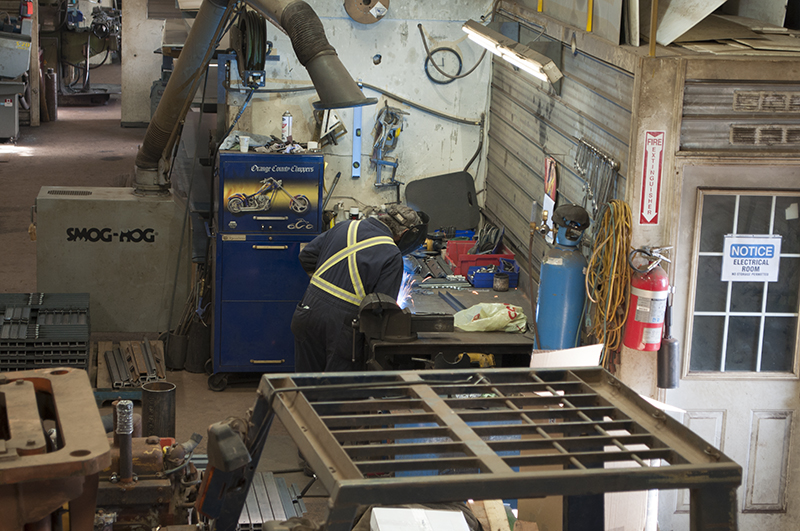
Gerald Betts, welder//Photo credit: Laura Weatherbie/Salty
The company is known for its innovative approach to potato handling equipment and they offer a wide array of equipment which focuses on efficiently moving and processing potatoes. They manufacture bulk boxes that haul potatoes from the field to the warehouse, potato graders, telescopic bin pilers, drum washers, hoppers, potato box fillers, as well as trailer inserts made with food-grade stainless steel for hauling the washed potatoes from the warehouse to a processing plant.
In 2001, Harvey Stewart was busy with a new venture, Trout River Industries, so he handed the reins over to his sons, Sandy and Stephen Stewart. Sandy had trained as a Red Seal machinist and was working in the shop, and Stephen was finished his education in business at Holland College, so their succession to company president and vice-president made perfect sense. Speaking to Sandy Stewart about the company and its growth, his enthusiasm was clear, “I was ready, willing and wanting to grab hold of it.”
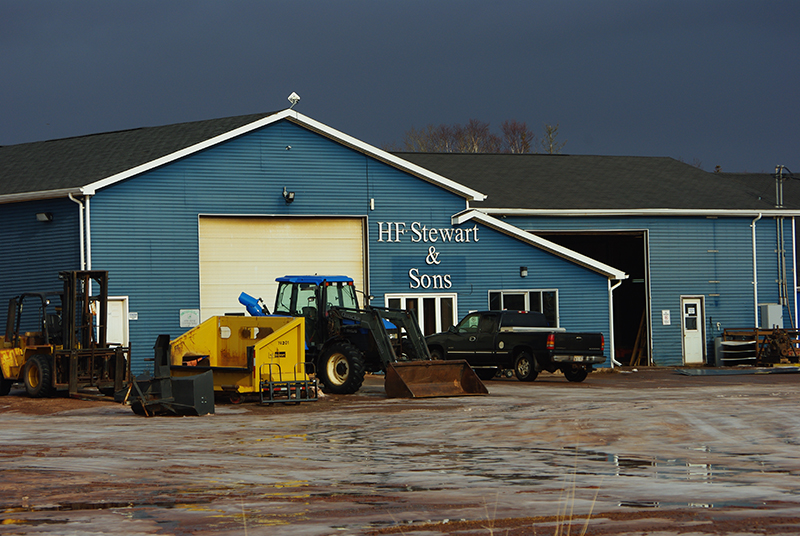
An expansion in 2016 doubled the company’s space//Photo credit: Cheryl Young/Salty
Over time, by listening to their customers, the company has designed equipment that allows for more precise handling of potatoes. Their live floor system (a conveyor belt in the bottom of the box which allows for vegetables to be moved quickly but gently) is an example of innovation that came out of conversations with farmers. “We designed this [live floor] back in the early 2000s, we were kinda the first at it here on the Island, pretty well in North America, we were the first ones to bring it to the agricultural side. We had a farmer that come to us and said, there’s got to be a better way of doing this,” Stewart said. The success of the design was so great, that Stewart has a few minor regrets about not patenting the method, “It seems to be the way everyone is going now, but I kinda sorta smile and say, ‘it started here, I got a little bit of bragging rights to it’.”
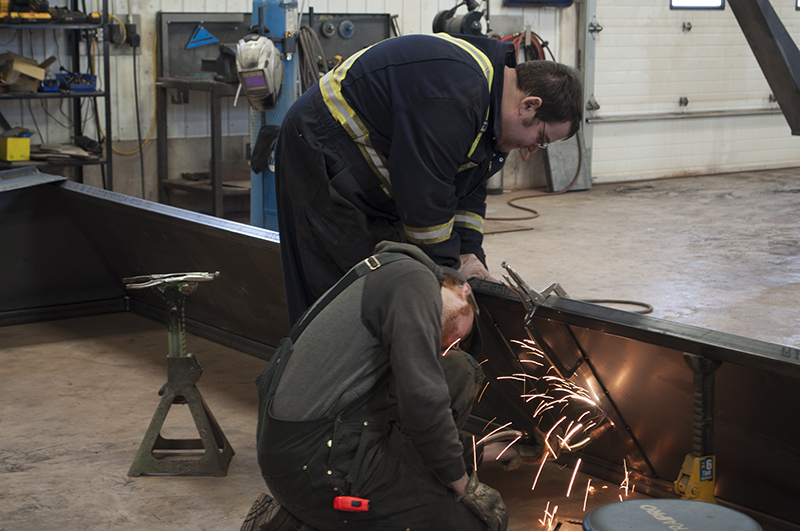
Jaron Harris and Chad Rayner weld a bulk box//Photo credit: Laura Weatherbie/Salty
“It’s all about making solutions. And if you can, and you can do it right, and service it and cut down on people’s downtime and make them money from your product, not just sell them a product for me to make money… but you have to sell something, that they can make money off of too,” Stewart said when discussing the company’s philosophy.
Another solution H.F. Stewart offers to the potato industry is a van trailer insert, a long trough that sits inside an insulated truck trailer. Using the same live floor concept, the insert allows for a more efficient and safe way to transport mass quantities of potatoes to a manufacturing plant. “It can be pulled in and out [of trailers] very easily, it seals to the sides, it moves all the dirt out the back, so there’s no need of people getting in to scrape, to clean. It’s more safe,” Stewart said. Again, after customer feedback, the company modified their production to include a stainless steel liner. “We came up with a different welding process, that we can weld our stainless to our mild steel, and we’re putting a stainless liner inside that’s welding to our ribs, so that everything that the product touches is food-grade.” This allows the farmer to accommodate the requests of the large production plants like Cavendish and McCain.
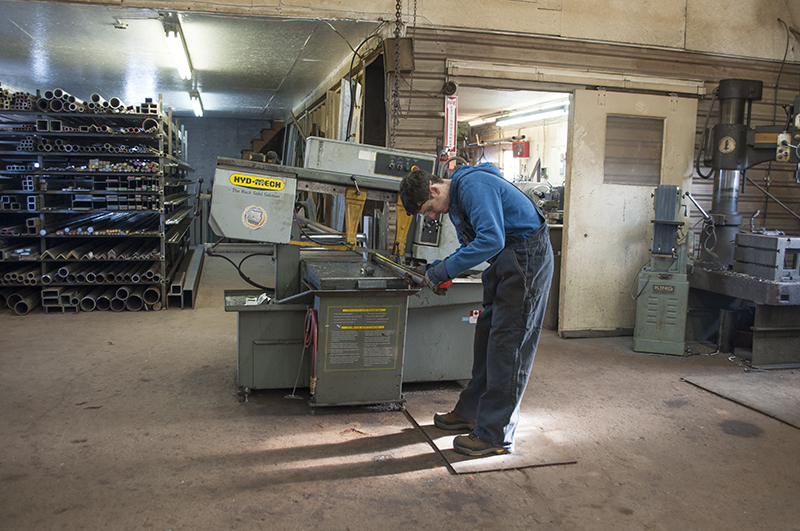
Wade Silliker, a machinist, cuts a metal rod//Photo credit: Laura Weatherbie/Salty
Every step of the way, the manufacturing of this equipment occurs in West Point. Some of the larger steel pieces had been cut and shipped in from New Brunswick, but now, even this stage will take place here in West Point. “We just purchased a new CNC plasma table. We found with a lot of our manufacturing, it’s going that way, you have to build parts, they have to be the same every time. To keep production going, it was the only way to go,” Stewart said. “It speeds things up. We’ve gone from building like maybe one unit to probably three units a month. We’ve added more employees, with more employees, they need more material to use so you have to keep up with that.” Stewart said that the business has doubled over the past four or five years, so the investment in equipment and space is necessary.
“I like a challenge. And being here is a challenge, from getting three-phase power, which we don’t have here, we have to create that ourselves here, so there’s a cost to all that, yes, but we [the public] buy stuff from China, China’s a long ways away. It’s further from China to Ontario, than it is from us to Ontario…I like it when people point out ‘how are you doing this here in a small town?’ and I just sorta smile, and say ‘just fine’.”
With customers across Canada and the US, as well as having shipped overseas, H.F. Stewart has a broad customer base, however concentrating on the Atlantic Canada, Quebec, and Ontario markets allows them to offer quality service. Stewart stands behind his product and should a customer need a part or a service call, he wants to be able to come through for them in a timely fashion.
Currently 14 employees work at the company. Office staff, welders, engineers, fabricators, machinists, and draftspeople all have an integral part in the company’s success. The Stewart brothers have assembled a staff who are able to not just manufacture the equipment they sell, but they can service it as well.
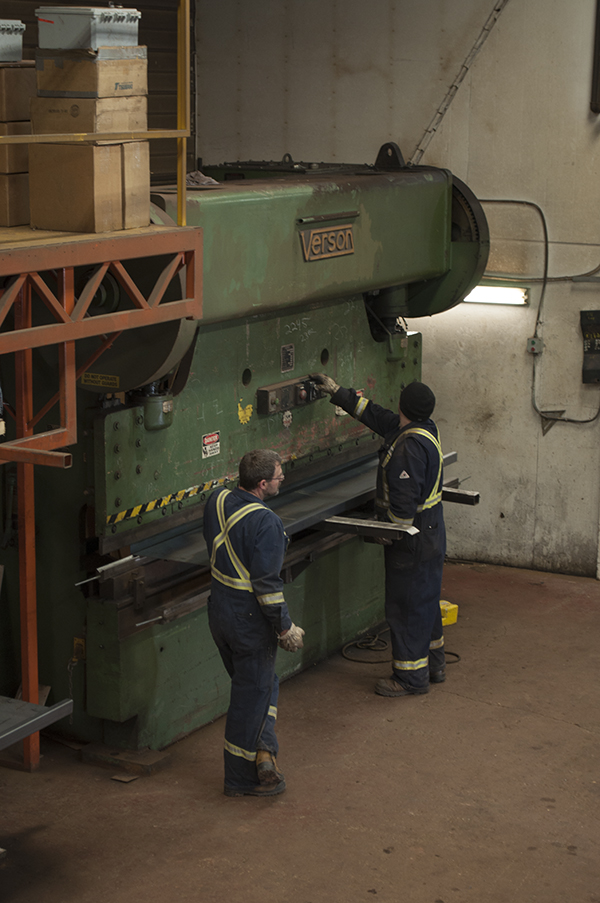
Brent Champion and Jaron Harris bend metal//Photo credit: Laura Weatherbie/Salty
The company also manufactures custom orders for clients. Sandy Stewart attributes the recent success in the business to both the growth in the economy and a shift in the company’s thinking. “We always were busy, but we didn’t know we could be busier, because we’d get calls and we’d be like, ‘we can’t do it, we wish we could’…, let’s figure out how we can do things quicker and get more stuff out the door. In turn, we’re working the same amount of weeks, the same amount of hours, but then we’re putting more equipment out, more parts out the door.”
The parts department now accounts for a significant portion of the business, due to expanding their inventory beyond just farm equipment parts to a shop that offers parts for fishers and other industries as well. The philosophy behind the expansion is simple, Stewart wants to fill the need of farmers and other customers. “If they call and say ‘well do you have that’ and we say ‘yes’, well then we’re the first ones to call the next time.” With the rural location, being able to offer customers a needed part within hours is a definite advantage.
West Point may be a sparsely populated rural area (the 2016 census has the area’s population at 556) but that hasn’t stopped Stewart from taking the manufacturing company to the next level. As the president of H.F. Stewart, he is determined to keep his business firmly based in West Point. An expansion last year increased the business’ manufacturing space by 7000 square feet. Actively involved in his community as a volunteer fireman and recognizing the importance of maintaining his ties to his home, keeping H.F. Stewart in the location where it began is paramount for Stewart. “When we built the piece on, there was a lot of people come and said ‘Move it out to the main road’. And yes, we probably could have got a lot more business out there, but this is where we started, this is my hometown. I take very big pride in my hometown.”
When asked where he sees H.F. Stewart in the future, Stewart has big plans, “Hopefully putting out a good product, building more, hiring local people, doing what I do, on PEI, building equipment that is worldwide. We always looked at, well, to get stuff around the Island, it’s quite a to-do, now we’re into Canada, why not be global?”
- WTF - December 2, 2020
- WHAT GOES AROUND COMES AROUND - June 12, 2020
- Salty’s 2020 Gift Guide - December 2, 2020
- A RETURN OF DELIVERY - May 6, 2020
- ICYMI - April 22, 2020
- NEW BIOMASS BOILERS FOR LOCAL GREENHOUSE - March 31, 2020
- TOP CHEF CANADA COMPETITOR FROM PEI - March 4, 2020
- FOOD INSECURE - March 1, 2020
- ACCESS TO FRESH PRODUCE - March 1, 2020
- POLITICS OF SCHOOL FOOD - March 1, 2020

